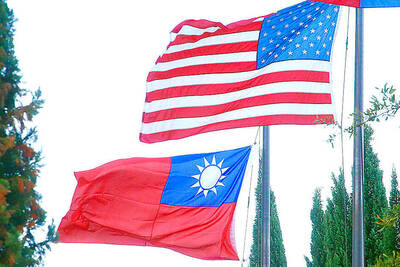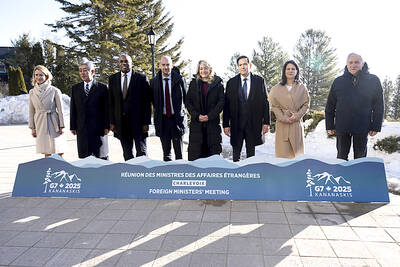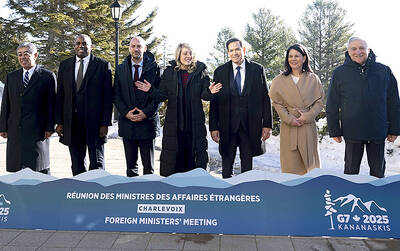President William Lai (賴清德) yesterday authorized new national targets for reducing carbon emissions in response to the global failure to limit climate warming to 1.5°C and a surge in extreme weather events.
Speaking at the third meeting of the National Climate Change Committee in Taipei, he said that the revised goal is to achieve a 32 percent reduction in emissions by 2032 and a 38 percent reduction by 2035 to a margin of 2 percentage points against emission levels in 2005.
The changes followed last month’s announcement by the Ministry of Environment that the nation’s 2030 goal is to reduce emissions by 26 to 30 percent, up from the previous goal of reducing emissions by 23 to 25 percent.

Photo courtesy of the Presidential Office
Citing the World Meteorological Organization, Lai said that last year was the warmest year on record and that global temperatures have increased by 1.5°C on average compared to preindustrial levels, referring to the red line drawn by the UN Intergovernmental Panel on Climate Change.
Extreme climate events, including devastating fires in Los Angeles, underscore the urgency of responding to climate change, he said.
Under Vice Premier Cheng Li-chiun’s (鄭麗君) leadership, the Cabinet has conducted a series of discussions between high-ranking officials and scientists toward strengthening decarbonization efforts and discharging the nation’s duty to global governance, Lai said.
The conclusion reached by the discussions was that Taiwan must supplement its bottom-up approach to decarbonization with top-down planning to ensure targets are sufficiently rigorous, he said.
Lai acknowledged that the updated plan, dubbed National Determined Contribution 3.0 beta, would be overly ambitious to some and not ambitious enough to others, but added that officials have been pragmatic in setting the goals.
Achieving carbon emissions targets would require coordinated effort from the government, enterprises, educational institutions and civil society, he said.
The Executive Yuan has been directed to incorporate innovative technology, financial support, carbon pricing, regulatory changes, green leadership and community-led initiatives in planning the “flagship program,” Lai said.
In addition, awareness of the necessity to respond to climate change must be embedded in society through educational initiatives controlled at the national level, he said.
The Ministry of Environment and Ministry of Education have been ordered to launch a joint effort in climate education targeting young Taiwanese under the stipulations of the Climate Change Response Act (氣候變遷因應法), Lai said.

Taiwan’s Lee Chia-hao (李佳豪) on Sunday won a silver medal at the All England Open Badminton Championships in Birmingham, England, a career best. Lee, 25, took silver in the final of the men’s singles against world No. 1 Shi Yuqi (石宇奇) of China, who won 21-17, 21-19 in a tough match that lasted 51 minutes. After the match, the Taiwanese player, who ranks No. 22 in the world, said it felt unreal to be challenging an opponent of Shi’s caliber. “I had to be in peak form, and constantly switch my rhythm and tactics in order to score points effectively,” he said. Lee got

EMBRACING TAIWAN: US lawmakers have introduced an act aiming to replace the use of ‘Chinese Taipei’ with ‘Taiwan’ across all Washington’s federal agencies A group of US House of Representatives lawmakers has introduced legislation to replace the term “Chinese Taipei” with “Taiwan” across all federal agencies. US Representative Byron Donalds announced the introduction of the “America supports Taiwan act,” which would mandate federal agencies adopt “Taiwan” in place of “Chinese Taipei,” a news release on his page on the US House of Representatives’ Web site said. US representatives Mike Collins, Barry Moore and Tom Tiffany are cosponsors of the legislation, US political newspaper The Hill reported yesterday. “The legislation is a push to normalize the position of Taiwan as an autonomous country, although the official US

CHANGE OF TONE: G7 foreign ministers dropped past reassurances that there is no change in the position of the G7 members on Taiwan, including ‘one China’ policies G7 foreign ministers on Friday took a tough stance on China, stepping up their language on Taiwan and omitting some conciliatory references from past statements, including to “one China” policies. A statement by ministers meeting in Canada mirrored last month’s Japan-US statement in condemning “coercion” toward Taiwan. Compared with a G7 foreign ministers’ statement in November last year, the statement added members’ concerns over China’s nuclear buildup, although it omitted references to their concerns about Beijing’s human rights abuses in Xinjiang, Tibet and Hong Kong. Also missing were references stressing the desire for “constructive and stable relations with China” and

Foreign ministers of leading Western democracies sought to show a united front in Canada yesterday after seven weeks of rising tensions between US allies and US President Donald Trump over his upending of foreign policy on Ukraine and imposing of tariffs. The G7 ministers from the UK, Canada, France, Germany, Italy, Japan and the US, along with the EU, convened in the remote tourist town of La Malbaie, nestled in the Quebec hills, for two days of meetings that in the past have broadly been consensual on the issues they face. Top of the agenda for Washington’s partners would be getting a